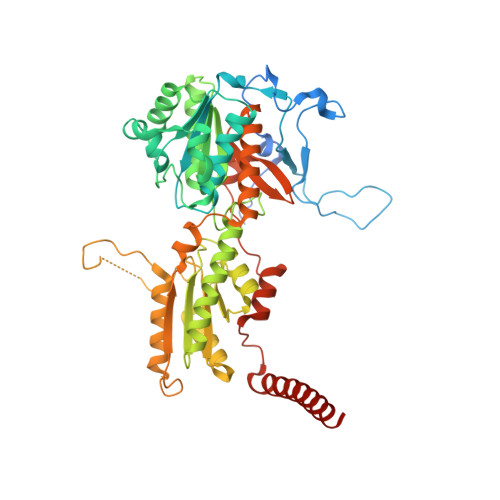Fast acting allosteric phosphofructokinase inhibitors block trypanosome glycolysis and cure acute African trypanosomiasis in mice.
McNae, I.W., Kinkead, J., Malik, D., Yen, L.H., Walker, M.K., Swain, C., Webster, S.P., Gray, N., Fernandes, P.M., Myburgh, E., Blackburn, E.A., Ritchie, R., Austin, C., Wear, M.A., Highton, A.J., Keats, A.J., Vong, A., Dornan, J., Mottram, J.C., Michels, P.A.M., Pettit, S., Walkinshaw, M.D.(2021) Nat Commun 12: 1052-1052
- PubMed: 33594070
- DOI: https://doi.org/10.1038/s41467-021-21273-6
- Primary Citation of Related Structures:
6QU3, 6QU4, 6QU5 - PubMed Abstract:
The parasitic protist Trypanosoma brucei is the causative agent of Human African Trypanosomiasis, also known as sleeping sickness. The parasite enters the blood via the bite of the tsetse fly where it is wholly reliant on glycolysis for the production of ATP. Glycolytic enzymes have been regarded as challenging drug targets because of their highly conserved active sites and phosphorylated substrates. We describe the development of novel small molecule allosteric inhibitors of trypanosome phosphofructokinase (PFK) that block the glycolytic pathway resulting in very fast parasite kill times with no inhibition of human PFKs. The compounds cross the blood brain barrier and single day oral dosing cures parasitaemia in a stage 1 animal model of human African trypanosomiasis. This study demonstrates that it is possible to target glycolysis and additionally shows how differences in allosteric mechanisms may allow the development of species-specific inhibitors to tackle a range of proliferative or infectious diseases.
Organizational Affiliation:
Wellcome Centre for Cell Biology, School of Biological Sciences, University of Edinburgh, Michael Swann Building, Max Born Crescent, Edinburgh, UK.


















